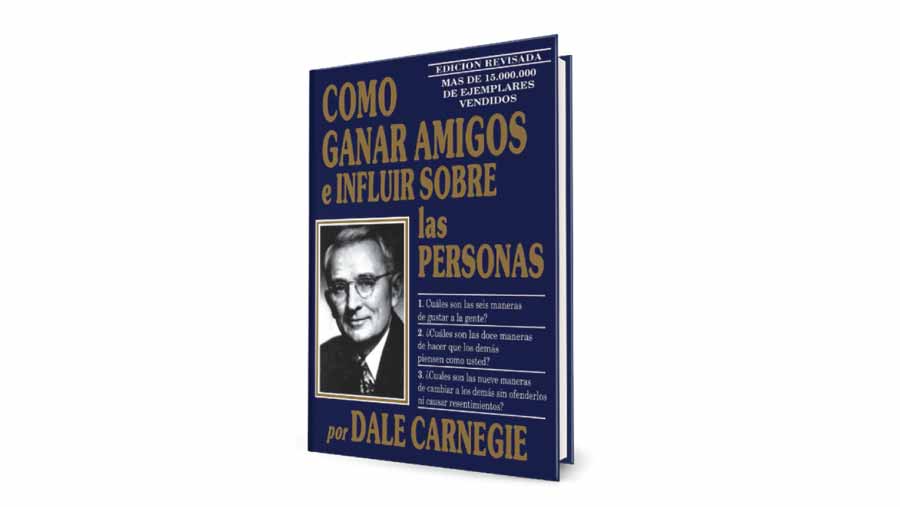“How to Win Friends and Influence People” is a book written by Dale Carnegie in 1936. Since its publication, it has been regarded as one of the best self-help and personal development books of all time. In this article, we will explore the most important concepts and lessons from this book, as well as their relevance in today’s world.
Book review
Dale Carnegie’s “How to Win Friends and Influence People” is a classic self-help book that has been popular for more than 80 years. The book is designed to help people improve their interpersonal skills, which will allow them to have more positive and effective relationships with others.
The structure of the book is simple and easy to follow. Each chapter focuses on a specific topic, such as “making friends and being popular” or “influencing others without offending them or arousing resentment.” Each chapter offers real-life examples and anecdotes to illustrate the principles being presented. In addition, each chapter includes a concise summary of the key points and offers practical advice on how to apply the principles in daily life.
One of the things that make this book effective is that the lessons it presents are timeless. Although the book was written in the 1930s, the lessons it offers are equally relevant today. Interpersonal skills are important in any era, and the techniques presented in the book can help people improve their personal and professional relationships.
Another thing that makes this book effective is that it is easy to understand and apply. The techniques presented in the book are simple but powerful, and anyone can begin to apply them in their daily life. In addition, the book is written in a conversational style that makes reading enjoyable and easy to follow.
Overall, “How to Win Friends and Influence People” is a classic book that has helped millions of people improve their interpersonal skills and have more positive and effective relationships. If you are looking to improve your interpersonal skills and have more effective relationships, this book is a great choice.
Why it’s important to read this book today
It’s important to read “How to Win Friends and Influence People” today because in the digital age we live in, interpersonal skills are more important than ever. With social media and technology, we often find ourselves interacting with others through a screen rather than in person. It’s easy to forget the importance of interpersonal skills in a world where online communication is becoming more common.
This book can help people remember the importance of interpersonal skills and provide them with techniques and tips to improve them. Skills such as being a good listener, showing empathy and understanding, and communicating clearly are essential to having successful relationships in personal and professional life. These skills are especially important today, when online communication may be less clear and effective.
Moreover, this book offers timeless lessons that are equally relevant today as they were 80 years ago when it was first published. The techniques presented in the book have been tested and used by millions of people around the world, proving their effectiveness. If you want to improve your interpersonal skills and have more effective relationships in today’s digital world, “How to Win Friends and Influence People” is a must-read book.
1: Fundamental techniques for dealing with people
- Ability to deal with people
- The principle of self-interest
- The smile
- Remember people’s names
- Be a good listener
- Talk about what interests the other
- Making the other person feel important
2: Six Ways to Make People Like It
- Making the other person feel important
- The importance of sincere praise
- Being considerate of others
- Ask questions instead of giving direct orders
- Talking about your own mistakes before criticizing others
- Make the other person happy to do what you want them to do
3: How to influence people to think like you
- The only way to win an argument
- How to avoid arguments
- Demonstrate respect for the opinions of others
- If you are wrong, admit it quickly and enthusiastically
- Start with sincere praise or appreciation
- Ask questions instead of giving orders
- Allowing the other person to save their own face
4: Being a leader: how to change people without offending them or arousing resentment
- Start with a sincere affirmation
- Ask questions instead of giving direct orders
- Let the other person save their own face
- Praise progress, not just final achievement
- Be understanding of people and their motivations
- Making the other person feel important
5: How to achieve a life full of happiness
- The importance of having a purpose in life
- Do something you really like
- Being a good friend and making friends
- Learn to enjoy life and not worry so much
- The importance of self-assessment and self-improvement
How can I apply the lessons in this book in my everyday life?
Of course! Here are some ways you can apply the lessons from this book in your everyday life:
Practice empathy and try to understand the views of others before trying to make them think like you.
Make an effort to remember people’s names and call them by name. This will make them feel valued and heard.
Be a good listener and show interest in what others have to say. Listening to others and showing an understanding attitude can help build strong, lasting relationships.
Praise people sincerely and avoid unnecessary criticism. People tend to respond better to positivity than to negativity.
Talk about what the other person is interested in and ask questions to better understand their interests and needs.
Be considerate of others and show respect toward them, even if you disagree with their opinions.
Take responsibility for your mistakes and show an open attitude and willingness to learn.
Try to make the other person feel important and value their contributions. We all have something to offer and acknowledging that can foster a positive and constructive attitude in others.
I hope these tips will be helpful to you to apply the lessons of “How to win friends and influence people” in your daily life.
Is it necessary to read the book from beginning to end to obtain benefits?
Not necessarily. While reading the entire book can provide a more complete understanding of the lessons being presented, you can still reap significant benefits by reading only a few sections or chapters that are relevant to your specific needs and goals. The book is structured so that each chapter focuses on a specific skill or technique, allowing readers to jump to the sections that are most relevant to them.
That said, it is recommended to read the entire book to gain a more complete understanding of the general philosophy and strategies presented. Reading the entire book can help contextualize individual lessons and offer a deeper understanding of how they can be applied in different situations and relationships.
In summary, it is not necessary to read the entire book to reap benefits, but it is recommended to do so to gain a full understanding of the lessons and strategies presented.
How can I remember someone’s name if I’m bad at it?
If you’re having trouble remembering people’s names, here are some tips that may help:
Repeat the name several times in your head or out loud when you first hear it.
Associate the name with something familiar or easy to remember, such as a physical characteristic or shared interest.
Ask for the person’s name again during the conversation, and use their name in the conversation to help reinforce it in their memory.
Write the person’s name and some details about them in a notebook or on your phone to review later.
If you’re in a social situation, consider introducing the person to someone else, and use their name during the presentation to help cement their memory.
If possible, go over the names before a meeting or event, either by consulting a list or by doing a mental review of the names of the people you expect to see.
Remember that remembering names can be a challenge for many people, and that it’s common to forget them from time to time. Don’t feel bad if you’re struggling, and keep trying to practice these techniques to improve your ability to remember names.
Is there a situation where I shouldn’t follow the advice in the book?
While “How to Win Friends and Influence People” offers many effective strategies for improving interpersonal relationships, there are some situations where your advice may not be appropriate. Here are some examples:
If the advice in the book conflicts with your personal or ethical values, you should not follow them. It’s important to maintain integrity and authenticity in all of your interactions, even if it means not following the influence techniques suggested in the book.
If you’re dealing with someone who has a mental or emotional health issue, the strategies in the book may not be effective or may even be harmful. In these situations, it is important to seek professional help and address the situation appropriately.
If you are trying to establish an equal and respectful relationship with someone, it may be necessary to adapt the strategies in the book to ensure that you are not exercising undue control or manipulating the other person.
In situations where transparency and honesty are required, it can be counterproductive to follow the strategies of the book, as they can undermine trust and authenticity.
In summary, while the strategies presented in the book can be effective in many situations, it is important to be aware of the limitations and adapt them to the personal needs and values in each specific situation.
What other self-help books do you recommend reading?
There are many excellent self-help books that can help improve people’s lives. Here are some recommendations:
“The Power of Now” by Eckhart Tolle – This book offers a unique perspective on how to live in the present moment and find inner peace.
“The 7 Habits of Highly Effective People” by Stephen Covey – This book offers practical tips on how to increase productivity and improve interpersonal relationships.
“The Magic of Order” by Marie Kondo – This book offers practical tips on how to organize and simplify life, reduce stress and find happiness.
“The Monk Who Sold His Ferrari” by Robin Sharma – This book presents an inspiring story about finding balance and happiness in life.
“Women Who Run with Wolves” by Clarissa Pinkola Estás – This book offers a unique perspective on female empowerment and how to embrace one’s own wilderness.
“The Art of Loving” by Erich Fromm – This book offers a perspective on love and human relationships, as well as practical tips for improving them.
“Emotional Intelligence” by Daniel Goleman – This book explores how emotions affect human behavior and offers practical advice on how to develop emotional intelligence.
These are just a few examples of popular and effective self-help books. The choice of book will depend on the individual interests and needs of each person.


